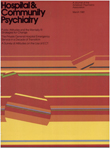Hospital Proximity and Public Acceptance of the Mentally Ill
Abstract
Knowledge of the effect of the geographical proximity of a mental health facility on the public's attitudes toward the mentally ill is useful for community education efforts to reduce public opposition to a facility and rejection of its patients. To study the influence of proximity to a state mental hospital on neighborhood attitudes toward the mentally ill, the author surveyed 140 residents of two similar neighborhoods, one located adjacent to the hospital and the other half a mile away. Acceptance of individuals with symptoms of severe mental illness was significantly higher in the adjacent neighborhood, but there was no difference between the neighborhoods in acceptance of the moderately mentally ill. The results also suggested that residents living immediately adjacent to the hospital were less accepting than the norm for the neighborhood.
Access content
To read the fulltext, please use one of the options below to sign in or purchase access.- Personal login
- Institutional Login
- Sign in via OpenAthens
- Register for access
-
Please login/register if you wish to pair your device and check access availability.
Not a subscriber?
PsychiatryOnline subscription options offer access to the DSM-5 library, books, journals, CME, and patient resources. This all-in-one virtual library provides psychiatrists and mental health professionals with key resources for diagnosis, treatment, research, and professional development.
Need more help? PsychiatryOnline Customer Service may be reached by emailing [email protected] or by calling 800-368-5777 (in the U.S.) or 703-907-7322 (outside the U.S.).



